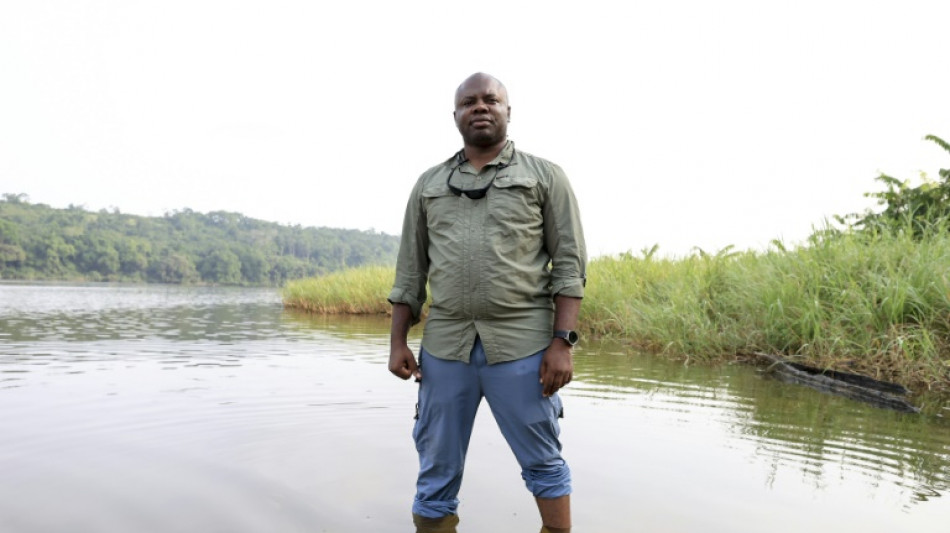
-
 Rory McIlroy wins seventh Race to Dubai title
Rory McIlroy wins seventh Race to Dubai title
-
Samsung plans $310 bn investment to power AI expansion

-
 Harmer stars as South Africa stun India in low-scoring Test
Harmer stars as South Africa stun India in low-scoring Test
-
Mitchell ton steers New Zealand to seven-run win in first Windies ODI

-
 Harmer stars as South Africa bowl out India for 93 to win Test
Harmer stars as South Africa bowl out India for 93 to win Test
-
China authorities approve arrest of ex-abbot of Shaolin Temple

-
 Clashes erupt in Mexico City anti-crime protests, injuring 120
Clashes erupt in Mexico City anti-crime protests, injuring 120
-
India, without Gill, 10-2 at lunch chasing 124 to beat S.Africa

-
 Bavuma fifty makes India chase 124 in first Test
Bavuma fifty makes India chase 124 in first Test
-
Mitchell ton lifts New Zealand to 269-7 in first Windies ODI

-
 Ex-abbot of China's Shaolin Temple arrested for embezzlement
Ex-abbot of China's Shaolin Temple arrested for embezzlement
-
Doncic scores 41 to propel Lakers to NBA win over Bucks

-
 Colombia beats New Zealand 2-1 in friendly clash
Colombia beats New Zealand 2-1 in friendly clash
-
France's Aymoz wins Skate America men's gold as Tomono falters

-
 Gambling ads target Indonesian Meta users despite ban
Gambling ads target Indonesian Meta users despite ban
-
Joe Root: England great chases elusive century in Australia

-
 England's Archer in 'happy place', Wood 'full of energy' ahead of Ashes
England's Archer in 'happy place', Wood 'full of energy' ahead of Ashes
-
Luxury houses eye India, but barriers remain

-
 Budget coffee start-up leaves bitter taste in Berlin
Budget coffee start-up leaves bitter taste in Berlin
-
Reyna, Balogun on target for USA in 2-1 win over Paraguay

-
 Japa's Miura and Kihara capture Skate America pairs gold
Japa's Miura and Kihara capture Skate America pairs gold
-
Who can qualify for 2026 World Cup in final round of European qualifiers

-
 UK to cut protections for refugees under asylum 'overhaul'
UK to cut protections for refugees under asylum 'overhaul'
-
England's Tuchel plays down records before final World Cup qualifier

-
 Depoortere double helps France hold off spirited Fiji
Depoortere double helps France hold off spirited Fiji
-
Scotland face World Cup shootout against Denmark after Greece defeat

-
 Hansen hat-trick inspires Irish to record win over Australia
Hansen hat-trick inspires Irish to record win over Australia
-
Alcaraz secures ATP Finals showdown with 'favourite' Sinner

-
 UK to cut protections for refugees under asylum 'overhaul': govt
UK to cut protections for refugees under asylum 'overhaul': govt
-
Spain, Switzerland on World Cup brink as Belgium also made to wait

-
 Sweden's Grant leads by one at LPGA Annika tournament
Sweden's Grant leads by one at LPGA Annika tournament
-
Scotland cling to hopes of automatic World Cup qualification despite Greece defeat

-
 Alcaraz secures ATP Finals showdown with great rival Sinner
Alcaraz secures ATP Finals showdown with great rival Sinner
-
England captain Itoje savours 'special' New Zealand win

-
 Wales's Evans denies Japan historic win with last-gasp penalty
Wales's Evans denies Japan historic win with last-gasp penalty
-
Zelensky renews calls for more air defence after deadly strike on Kyiv

-
 NBA's struggling Pelicans sack coach Willie Green
NBA's struggling Pelicans sack coach Willie Green
-
Petain tribute comments raise 'revisionist' storm in France

-
 Spain on World Cup brink as Belgium also made to wait
Spain on World Cup brink as Belgium also made to wait
-
Spain virtually seal World Cup qualification in Georgia romp

-
 M23, DR Congo sign new peace roadmap in Doha
M23, DR Congo sign new peace roadmap in Doha
-
Estevao, Casemiro on target for Brazil in Senegal win

-
 Ford steers England to rare win over New Zealand
Ford steers England to rare win over New Zealand
-
Massive march in Brazil marks first big UN climate protest in years

-
 Spain rescues hundreds of exotic animals from unlicensed shelter
Spain rescues hundreds of exotic animals from unlicensed shelter
-
Huge fire sparked by explosions near Argentine capital 'contained'

-
 South Africa defy early red card to beat battling Italy
South Africa defy early red card to beat battling Italy
-
Sinner beats De Minaur to reach ATP Finals title match

-
 Zelensky vows overhaul of Ukraine's scandal-hit energy firms
Zelensky vows overhaul of Ukraine's scandal-hit energy firms
-
South Africa defy early red card to beat Italy


Saving the mysterious African manatee at Cameroon hotspot
Ever since his first hard-won sightings of African manatees, award-winning marine biologist Aristide Takoukam Kamla has been devoted to protecting the little known and atrisk aquatic mammals.
African manatees are found in fresh water along the coast of western Africa, such as in Cameroon's vast Lake Ossa where the researcher first saw them more than 10 years ago.
But they are shy creatures -- spotting them requires setting out before dawn when the lake is glassy and tranquil, all the better for following the trails of bubbles and, maybe just maybe, catching two big nostrils taking a quick breath.
"I was expecting to see them like on YouTube: in clear water, jumping like dolphins... a completely surreal idea" stemming from publications on manatees in Florida, the 39-year-old Cameroonian recalled, smiling.
Their African cousins, however, are very different and the then University of Dschang apprentice researcher had to row for a long time before being rewarded.
Thanks to local fishermen, Takoukam Kamla has now learnt how to spot African manatees more easily within the darkened depths of the 4,500-hectare (11,000-acre) Lake Ossa, part of a sprawling wildlife reserve in southwestern Cameroon.
They are his "favourite animal", the subject of his doctorate at the University of Florida -- and the reason he won this year's prestigious Whitley Award that recognises groundbreaking biodiversity work by grassroots conservationists.
- Endangered habitat, poaching -
American scientist Sarah Farinelli was moved to tears after seeing five African manatees, including a female with her calf, while out on the lake with Takoukam Kamla.
"Its huge! There are certain places in Africa where it's impossible to see them," said Farinelli, who is in her 30s and studies the marine mammals in Nigeria.
Much still eludes researchers about the Trichechus senegalensis -- how many are in Cameroon; how long do they live; when and where do they migrate.
African manatees are found between Mauritania and Angola but "it's a very little studied species, around which many mysteries still remain", Takoukam Kamla said.
Sometimes known as sea cows, the large marine herbivore is listed as "vulnerable" on the red list of the International Union for Conservation of Nature.
But the Cameroonian scientist thinks that is "an under-estimation of the real status of this species, which is subject to poaching" and whose habitat is "constantly in danger".
Takoukam Kamla set up the African Marine Mammal Conservation Organisation which has five laboratories including in the lakeside fishing village of Dizangue.
On Lake Ossa, the animal's sole predators are human -- only a few years ago, manatees were still being served up in the village restaurant.
Manatee hunting is now outlawed and the dish has vanished from menus. A blue statue of a manatee has even been erected in their honour.
But threats remain.
Takoukam Kamla, standing on the shores of the lake, points to a palm oil refinery whose waste is dumped into the water.
Another threat is the positioning of a net across the lake to maximise catches as it could "trap a small manatee in its mesh", he complained, getting into a heated discussion with a fisherman in his dug-out canoe.
"We're indigenous, we live off this and we have never had to suffer prohibitions at home," the old man grumbled bitterly.
"If you want to impose bans on us, you will have to pay us every month."
- Biological combat -
Relations between the scientists and the local communities whose fishing traditions have been passed down the generations are tricky.
But an environmental threat that struck three years ago brought their two worlds together.
Half of the lake's surface became covered by the invasive giant salvinia -- Salvinia molesta -- a free-floating plant that has made the lake uninhabitable for both fish and manatees.
To combat it, scientists used a microscopic insect that feeds exclusively on salvinia and called on the fishermen to help.
"They used to take the salvinia infested with weevils and put a bit everywhere in the lake," AMMCO researcher Thierry Aviti said.
Three years on, the menacing plant has all but disappeared.
"At one point, we couldn't cope anymore" but promises were kept, Dizangue fisherman Thierry Bossambo said, marked by the memories of long nights with no fish.
The bridges built with the fishermen is something Takoukam Kamla is keen to maintain to avoid "parachute science", a term referring to scientists dropping into local communities from their academic ivory towers to undertake field work.
And to counter possible poaching, he wants to develop the area's eco-tourism.
It's a "priority", agreed Gilbert Oum Ndjocka, curator of the nearby Douala-Edea National Park, who said "all stakeholders are allies for conservation".
M.AbuKhalil--SF-PST




